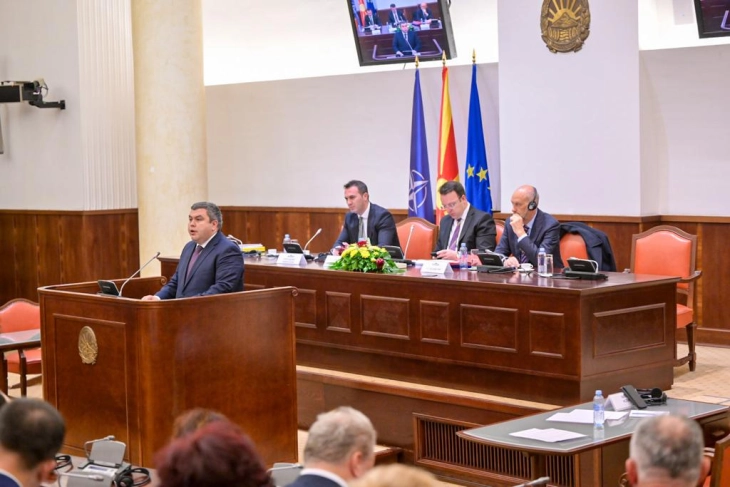Parliament committees discuss EC Progress Report on North Macedonia
- At Thursday’s session of Parliament’s Committee on European Affairs and the National European Integration Council focused on the European Commission’s Progress Report on North Macedonia, the parliamentary majority and opposition presented opposing views of the Report.

Skopje, 17 November 2023 (MIA) – At Thursday’s session of Parliament’s Committee on European Affairs and the National European Integration Council focused on the European Commission’s Progress Report on North Macedonia, the parliamentary majority and opposition presented opposing views of the Report.
At the session, EU Ambassador David Geer noted that the Report is honest but fair and highlights areas where progress hasn’t been achieved, especially areas seen as important by the EC, and described as part of the fundamentals in the negotiations.
Geer stressed that the Report expresses concern over the political polarization that has impacted the work of Parliament, thereby delaying necessary reforms.
“The EU accession process requires consensus between the political parties precisely over the key reforms. The Report notes excessive and sometimes inappropriate use of fast-track procedures. We urge that the ‘EU flag’ be used only when directly linked to the adoption of laws whose main goal is aligning with the EU acquis, and not to short-cut public debate on important issues. The flag was misused in the case of the amendments to the criminal legislation, and legislation related to Corridor VIII and X-d,” said Geer.
The EU Ambassador said the Report isn’t a judgement over what is being done, but should instead serve to inspire and motivate, since it notes where shortcomings exist in terms of progress, and in which areas there is progress.
Deputy Prime Minister in charge of European affairs, Bojan Marichikj, said the geopolitical context has led to a new approach in terms of the acceleration of the enlargement process by Brussels, pointing to the Growth Plan for the Western Balkans, which, he said, “accelerates the assistance for the region on the path to the EU”. Regarding the Growth Plan, he added that EUR 1 billion are potentially available for North Macedonia and the first transfer of funds is expected to happen in April 2024, if the necessary reforms are implemented.
“The most important message of the Growth Plan and the Report is that we mustn’t allow ourselves to prolong the deadlines and postpone the tasks. Postponing or putting North Macedonia’s EU negotiations and membership into question, also brings uncertainty to the reform process due to the EU standards. This latest Report also notes that the country is implementing steps in line with EU standards, and is working daily to fulfill its tasks,” said Marichikj.
The Deputy PM added that they see the remarks and criticism in the Report as recommendations for the priorities in the coming period, and as an important indicator of what should be done.
“The Commission also provides an objective overview of conditions. We have objectively determined and noted the issue with the work of the Judicial Council, for example, which is why we requested a peer review mission from the EC which is expected to provide concrete proposals on how to improve the work of this body,” said Marichikj.
In the Report, he added, the European Commission is also pointing to the need to adopt the constitutional amendments, as well as the commitments from the “Jean Monnet Dialogue”.
“It also asks those political parties and MPs who are working on an active blockade of Parliament to remove that blockade. We have also been requesting this for a long time, the citizens are insisting on it too, and now the EU as well. Based on the remarks it can be concluded that the obstructions are slowing down the fulfillment of conditions for the continuation of membership negotiations, and we can’t avoid responsibility over this regardless of how much we want to. Additionally, the adoption of the constitutional amendments remains a prerequisite that we cannot skip,” stressed Marichikj.
The Chairperson of the Foreign Affairs Committee and VMRO-DPMNE MP Antonio Miloshoski, said this is the worst EC Report the country has ever received, adding that the responsibility is on SDSM and DUI’s Government due to their unsuccessful implementation of policies.
“Regardless of how much some government official would like to relativize this Report, the figures show that Macedonia has received the worst Report since the EC has been assessing the progress of our country,” said Miloshovski, adding that it shows the judiciary and justice have been degraded, and that there are no reforms in judiciary and no rule of law.
Regarding the Growth Plan, Miloshovski added that the Report is risky in terms of the ability to access the funds, because reforms in the judiciary are a pre-condition for their use.







